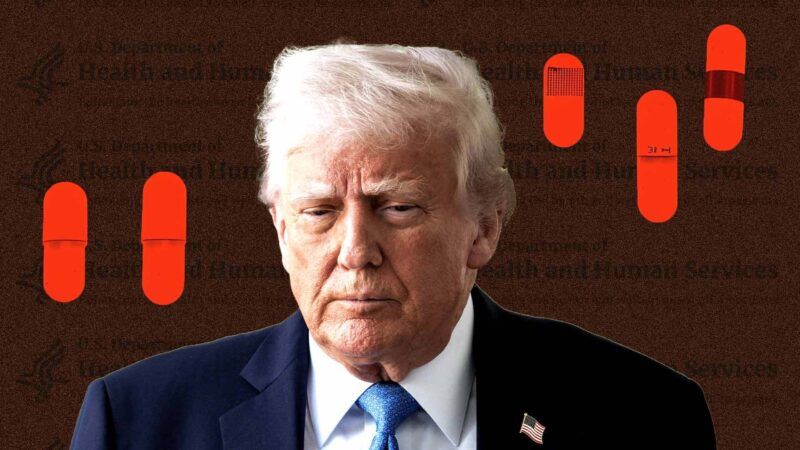Trump's Prescription Price Controls Would Lead to Fewer New Drugs
The executive order is likely unconstitutional, but if implemented as written, it would be detrimental to the American health care market.

In an executive order last week, President Donald Trump effectively instituted price controls on prescription drugs—not just those purchased by the government through Medicare and Medicaid, but apparently all prescription drugs sold in the United States. The order directed the Department of Health and Human Services (HHS) to "communicate most-favored-nation price targets to pharmaceutical manufacturers," meaning the companies must charge Americans the lowest price that any other country was getting for the same drug.
This week, HHS and the Centers for Medicare and Medicaid Services (CMS) announced they would being implementing the president's order. While it remains to be seen what actual legal authority—if any—the president has to impose such a directive, it's clear that if fully enacted, it would be detrimental to the American health care market.
"The Department has identified specific targets pharmaceutical manufacturers are expected to meet to satisfy the requirements of the Executive Order," according to an HHS press release on Tuesday.
The order intends to correct an imbalance between prescription prices in the U.S. and in other nations, specifically members of the Organization for Economic Co-operation and Development (OECD). "The prices Americans pay for brand-name drugs are more than three times the price other OECD nations pay," the White House claimed last week. "Americans are subsidizing drug-manufacturer profits and foreign health systems, despite drug manufacturers benefiting from generous research subsidies and enormous healthcare spending by the U.S. Government."
The complaint is valid: Americans do shoulder the brunt of the costs of new drugs, which are largely developed in the U.S. But there's a reason for that imbalance, which Trump's likely unconstitutional order not only wouldn't fix but would likely exacerbate.
In a Fox News op-ed, HHS Secretary Robert F. Kennedy Jr. called the order "a revolution in healthcare affordability. The plan is simple yet transformative: ensure Americans pay no more for medications than citizens of other wealthy nations."
But the order simply directs a Cabinet department to tell drug companies to charge less for their products. It doesn't mention any ways a drug company could lower its costs, and it doesn't list any steps the government will take to ease the costly regulatory burdens those companies face. The only thing revolutionary about the order is how brazenly it flouts constitutional principles by attempting to exert pressure on private companies.
"The [executive] order is a disaster," says Wayne Winegarden, senior fellow at the Pacific Research Institute, a free market think tank. "How do you implement this? How do you force, and by what authority do you force, private manufacturers to charge…a certain price?"
"We expect pharmaceutical manufacturers to fulfill their commitment to lower prices for American patients, or we will take action to ensure they do," Kennedy said, as quoted in the press release.
What form that action will take is unclear, though Trump's order did say in the event a manufacturer did not comply, HHS and other agencies should take certain steps like "enforcement action against any anti-competitive practices" and "review and potentially modify or revoke approvals granted for drugs, for those drugs that maybe [sic] be unsafe, ineffective, or improperly marketed." Presumably, the administration could start pulling approvals for a certain manufacturer's drugs, or threaten it with an antitrust lawsuit, unless the company hit its price targets.
But while Americans do pay a premium for prescription drugs over other industrialized nations, we get something for that premium. "The access issues in those countries are real," Winegarden says. "We have access to a much larger share of innovative medicines overall, we get them quicker here, and so if we adopt [price controls] here, we would have those same access issues."
It's also not uniformly the case that all drugs are more expensive here. A 2024 RAND report found that while name-brand drugs in the U.S. were "422 percent of prices in comparison countries," unbranded generics—which make up 90 percent of all prescriptions dispensed in the U.S.—"were on average cheaper at 67 percent of prices in comparison countries, where on average only 41 percent of prescription volume is for unbranded generics."
"Those countries are pricing the drugs well below the cost of capital," he adds. "The bottom line is there's a cost of capital involved in developing innovative medicines. And if you don't cover the cost of capital, you're not gonna continue to operate."
And while lowering the costs of drugs would expand access, it would also have negative consequences overall.
In 2019, the Elijah Cummings Lower Drug Costs Now Act passed the U.S. House before stalling in the Senate. The bill would have required HHS to negotiate the costs of several name-brand drugs for which there were no generic substitutes. When scoring the bill, the Congressional Budget Office (CBO) warned it could have negative effects on the pharmaceutical market.
"In the short term, lower prices would increase use of drugs and improve people's health," the report found. "In the longer term, CBO estimates that the reduction in manufacturers' revenues…would result in lower spending on research and development and thus reduce the introduction of new drugs." The CBO estimated that "a reduction in revenues of $0.5 trillion to $1 trillion would lead to a reduction of approximately 8 to 15 new drugs coming to market over the next 10 years."
To be sure, it's hard to argue with the premise of Trump's order: Americans do pay much more for new drugs than people in other countries, even though the majority of those drugs are developed and manufactured here. But that extra cash doesn't just line the pockets of CEOs and shareholders, it also actively funds the development of future drugs. And Trump's order—if it even passes constitutional muster—would directly jeopardize that.


Show Comments (114)